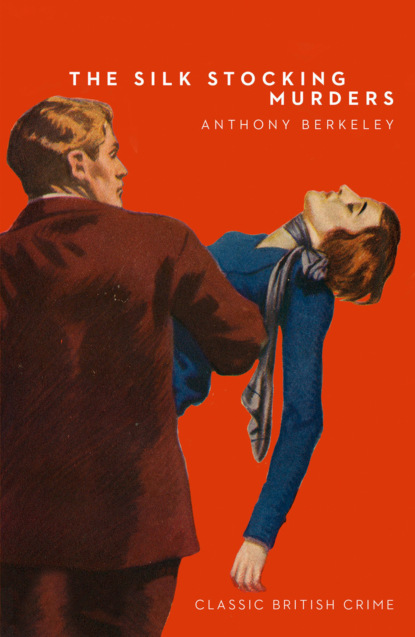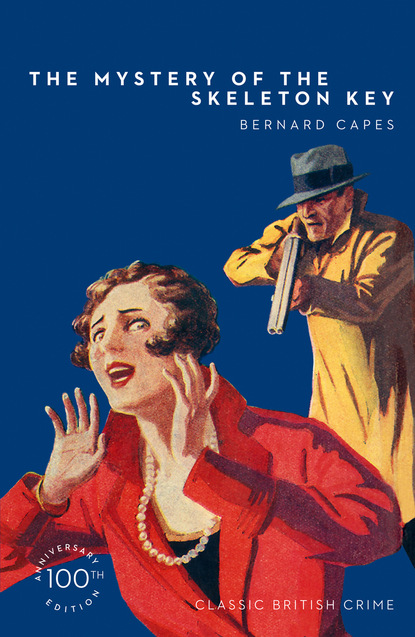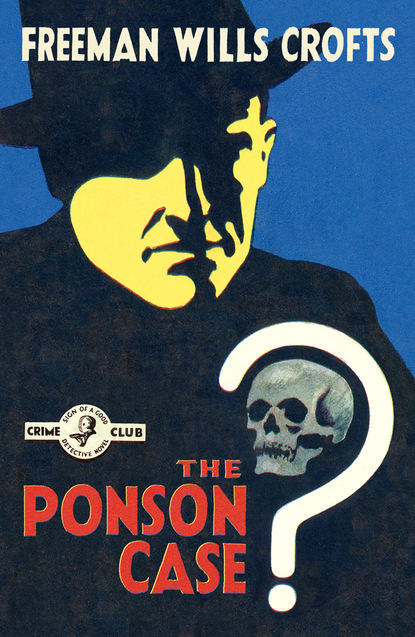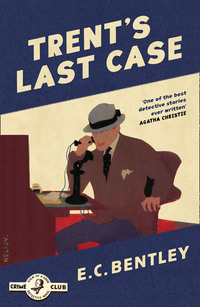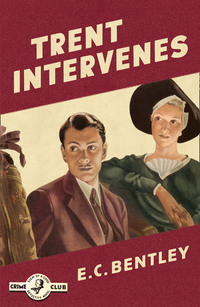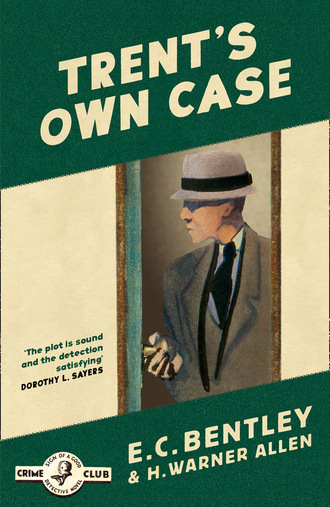
Полная версия
Trent’s Own Case
Leaving this point for later investigation, he turned next to the fireplace. Randolph, the police had learned, had always a good coal fire burning in this during the cold weather. Yesterday’s fire had long burnt itself out, and the inspector raked through the ashes with the small poker that lay to hand. Nothing, however, rewarded his search.
His eye travelled now over the floor of the room, and came to rest where, beneath the window, there lay a quantity of crumpled brown paper and tangled string, marring the extreme tidiness of the surroundings. A moment’s examination showed that several packets, fastened with sealed cord, had been opened, their contents removed, and the covers flung down carelessly. From the appearance of these relics Mr Bligh judged them to have been slim parcels containing letters or documents of some kind, each parcel conspicously marked with a number in soft black pencil. The string in each case, the seals being unbroken, had been cut with an instrument of peculiar sharpness, as the perfectly clean division of the strands made plain.
The inspector’s eyes narrowed as his deft fingers smoothed these crumpled wrappings into their original shapes—shells emptied, now, of so much perhaps explosive matter. Had Randolph been shot for the sake of what was in these packets? Was that the murderer’s intended spoil? Letters, or papers? Not money or valuables, certainly; enough of those had been left on the dressing-table. And what kind of letters or papers were worth the taking of a man’s life? Apart from secret treaties and other materials of thrilling fiction, which Mr Bligh did not take very seriously, he knew of one kind which had, not seldom, been considered worth that price of guilt and peril.
But surely old James Randolph, that busy architect of good works, could have had no interest in blackmail. Scotland Yard knew of some little peculiarities of his—it knows so much about so many public characters, little as they dream of it. But there was nothing savouring of illegality. Besides, the man had been for years immensely wealthy, and the sources of his wealth were no secret. There could have been no temptation to one of the most sordid of crimes.
Setting aside this difficulty for the time, Mr Bligh poked about diligently among the brown paper and string; and on the carpet beneath them he soon discovered a safety-razor blade. His lips pursed themselves in a silent whistle. Here, no doubt, was the instrument chosen hastily for the opening of the packets—a blade taken from the razor where it had been placed in readiness for use. Bending down, the inspector noted that this was a blade of the make that went with the unscrewed razor on the dressing-table; a duplicate of the two in unopened envelopes in the razor-case.
If, thought Mr Bligh, the man who cut strings with this blade has left no fingerprints, it can only have been because he was careful not to do so. The inspector used his own pocket-knife to raise the little slip of steel from the carpet, and place it beside the water-bottle and tumbler already destined for expert examination.
His eyes now began to search the wall at this part of the room, and he discovered at once the small keyhole of a built-in safe—a safe of a primitive type, as Mr Bligh’s experience suggested.
It was as he noted this that heavy and hasty footsteps were heard on the stairs, and the excited red face of a young constable appeared over the shoulder of the sergeant in the doorway. The formula which Mr Bligh had employed so many hundreds of times in the earliest phase of his career rose again to his lips. ‘Now then,’ he said gruffly, ‘what’s all this?’
‘This is the man posted at the street door,’ the sergeant explained in the tone of one inured to the follies of inexperience. ‘What is it, Clarkson?’
‘I’ve just found this, sir, in the corner of the passage, just inside the entrance,’ the young man said. ‘I thought it might be important.’ He held out a green tie-on luggage-label, the string of which had somehow been snapped. ‘It’s a dark spot just there, and this label is much the same shade as the carpet. The door opens into a narrow passage, as you know, sir, and it would be awkward going out in a hurry with a bag of any size. This label may have caught against something, and come off without it being noticed, if the man was a bit flurried—so I thought, sir.’
The inspector, who had listened to this with wooden impassivity, now took the label in his hand. It was inscribed, in a shaky but sufficiently legible script, ‘Bryan Fairman, passenger to Dieppe.’
‘Dieppe, eh?’ Mr Bligh said thoughtfully. ‘I wonder.’ He spoke sharply to the attentive sergeant. ‘Get me the Yard on the phone at once.’ The apparatus stood on one of the two small tables flanking the bed; and the sergeant jumped to it.
‘Very good, Clarkson,’ the inspector said. ‘This may very possibly have a bearing on the case. I am acting on it now. You can go back to your post.’ He took the telephone instrument in hand.
In a few moments he was in touch with a colleague at headquarters, and giving swift instructions that inquiry should be made whether a passenger giving the name of Bryan Fairman had travelled by the night-boat reaching Dieppe that morning. The French police, he said, should be asked to co-operate to the extent of keeping this man, if identified, under observation, supposing that he had remained in Dieppe. If not, it would be of great assistance if his movements could be traced, as a serious charge might be brought against him.
Mr Bligh rang off.
CHAPTER IV
NOT HARD OF HEARING
‘AND now,’ Inspector Bligh said to his subordinate, ‘for a look at the sitting-room, and that queer piece of evidence, as you call it.’
He led the way downstairs to the room beneath the bedroom. It was an apartment of less bare appearance than the other, an effect of more luxurious comfort being produced at once by the deep-piled, patternless grey carpet which covered the whole extent of the floor from wall to wall. Two low-backed, thick-cushioned armchairs flanked an old-fashioned fireplace. One of these, the one having its back towards the window, had between it and the wall a table just large enough to hold a grey-enamelled telephone instrument, a London telephone directory, and an orderly pile of journals and printed documents. There were an oval centre table and, before the window, a small writing-table; both, as the inspector correctly guessed, ‘pieces’ of great price. At right angles to this last an inviting double-ended sofa stood backed against the wall; beside it, rising a modest two feet from the floor, was a narrow bookcase. In the bedroom there had not been a book to be seen. The bookcase here appeared to be occupied entirely by works of reference, from the austerity of Bradshaw, Baedeker and Whitaker to the more engaging appeal of a tall row of art-sales annuals.
Mr Bligh spent little time in examining the room and its contents as a whole. All appeared to be in precisely the state of undisturbed neatness that a man of rigidly orderly habits would require in his own establishment. It was the writing-table to which a gesture from the police-sergeant directed his special attention. Upon it was trimly laid out the usual array of writing materials, with a small open-fronted cabinet of Chinese lacquer, on the shelves of which were arranged in various sizes, note-paper, sheets of blank paper, cards and envelopes.
Upon the flat top of the cabinet stood an upright engagement-block. It had a separate leaf, with a sentence of Scripture at the foot, allotted to each day, and the leaves were set loosely so as to be turned over on metal rings as each day passed. On the leaf which now met the eye, two afternoon appointments at City addresses were noted, followed by the words, ‘5:30. T. Searle to call,’ presumably referring to some visitor expected by Randolph at his own house. The leaf so exposed was that for the day which had just begun; not, as would have been natural, the leaf for the previous day, the day of the crime. That leaf was missing, and vestiges of paper showed that it had been torn roughly from the file. Handling the block delicately, the inspector satisfied himself that this was the only leaf that had been so removed.
The block, he knew, had not been touched during the first police examination of the premises some hours before, when the signs of a leaf having been torn away had been noted. He considered the fact with bent brows. Someone, before or after the murder, had been tampering with this record of Randolph’s arrangements, and tampering to some purpose. The fingers of Mr Bligh’s left hand drummed lightly on his hairless skull—an indication with him of restrained excitement.
‘You were right,’ he observed to the gratified sergeant. ‘This is important. I don’t know, though, that I should call it queer when a murderer destroys the only direct evidence of his having been on the spot. And now I want to see this man Raught. Send him to me in here.’
Randolph’s manservant, who had been told to stay in his bedroom adjoining the sitting-room, soon presented himself—a lean, small, dark-visaged individual with a furtive eye. A shifty-looking character at the best of times, thought the inspector; and now looking sick and frightened. Mr Bligh stared hard at him for a few moments; then said with a quietness that seemed only to add to the man’s discomfort: ‘So your name is Simon Raught.’
‘Yes, sir.’
‘You were the late Mr Randolph’s personal servant, and you always slept on the premises when he was staying here. That right?’
‘Yes, sir.’
‘Any other servants?’
‘Not here, sir. Mr Randolph kept his establishment at his place in Yorkshire, where he lived most of the time. Besides me, there’s only a woman, Mrs Barley, to look after this place. She has a door-key and her job is to keep the place tidy, all the year round. Mr Randolph liked to have it kept so that he could come to London any time without notice, and find it ready for occupation. So long as he did find it ready—which I must say he always did—Mrs Barley could arrange her time to suit herself. When we were here, I used always to get the breakfast and do the bedrooms myself.’
Mr Bligh, still bending on Raught a gaze which he continued to avoid meeting, said gently: ‘It isn’t exactly your place as valet, is it, to do that sort of thing?’
‘I didn’t consider that, sir—not in dealing with Mr Randolph,’ Raught said. He swallowed nervously, and went on: ‘I didn’t mind what I did for him, owing everything to him, as you might say.’
The inspector grunted sceptically. ‘What about this Mrs Barley?’ he asked. ‘Oughtn’t she to be here this morning?’
‘I don’t know when she’ll be coming in, sir,’ Raught declared. ‘She had been here when we got down from Yorkshire day before yesterday, and she was here yesterday morning for an hour. But as soon as she hears of what’s happened, she’ll be along quick enough, you may be sure of that.’
‘What do you know about her?’
‘She’s a perfectly respectable woman, sir, I need ’ardly say. Before her husband died—a carpenter, I believe he was—they rented one of Mr Randolph’s cottages in Humberstone. I have ’eard that Barley got into bad company, sir, and got himself into some sort of trouble, which Mr Randolph ’elped him out of; but there was never anything against Mrs Barley. Since he died, she’s been living with her sister, who keeps a boarding-house used by foreigners mostly, I’ve been told—in Bayswater it is, Oldbury Terrace, I forget the number.’
The inspector took down these particulars in his notebook; then referred to an earlier entry.
‘When you were first questioned this morning, you mentioned a secretary.’
‘Mr Verney; yes, sir. He’s the gentleman that had the management of all Mr Randolph’s charities and that—his good works, as you may say. When Mr Randolph was staying here—’
‘When did he stay here? How much time did he spend here?’
‘There was nothing regular about it, sir. Every few weeks—I couldn’t put it any nearer than that; sometimes it was more frequent—we would come down for two or three days. Or we might go back to Brinton the next day. This time we came the day before yesterday, the Tuesday.’
‘Well, now about Mr Verney.’
‘He was often up at Brinton, sir, the place in Yorkshire; but he didn’t live there. He had rooms here in London, in Purvis Crescent, No. 36—off Willesley Road; I believe he spends a lot of time running the Randolph Institute, sir, in Kilburn—a sort of club, that is, for young men and boys. Whenever we were here, Mr Verney would come in, having his own door-key, to talk business. I should have expected to see him here before this, sir.’
Mr Bligh took another note; then once more he fixed the man before him with an intimidating eye.
‘And where do you say you were last night, when your employer was murdered?’
Raught repeated the account of his movements of which the inspector had already learned the substance. It had been the valet’s half day off, as it always was on Wednesdays. He had not gone out until a little before 6:30, when he had done so after laying out Mr Randolph’s clothes for a dinner which he was to have attended. Raught, on leaving, had gone straight to the Three Tuns in Rowington Street, where he had spent some time, and had afterwards visited the Running Stag in Gooch Street. He had often ‘used’ both places while in London, and was well known. Miss Whicker at the Tuns and Archie at the Stag could bear out his statement. Raught had then joined his sister, Mrs Livings, and her husband at the Pilatus restaurant in Warsaw Street at 7:30. After dinner they had gone on to Battersea, where his relations lived, and had visited the Parthenon Cinema, where a film called ‘The Two-Gun Terror’ was being shown. After that he had had a drink at his brother-in-law’s place, and come back to Newbury Place just before twelve o’clock. He was not expected to be back, he explained, before midnight, Mr Randolph being ‘very human’ in that respect.
‘And then?’ Mr Bligh inquired in his uncomfortably colourless tone.
Raught had gone upstairs to see if his master had returned. He had found the bedroom door wide open, the lights on, and his master lying dead on the floor before the dressing-table; it had given him ‘such a turn, sir, as I never had in my life.’ He had ‘felt’ at once that Mr Randolph was dead. There couldn’t be any mistake about it, the valet said, looking at him as he lay ‘all of a heap.’ He had, therefore, rung up the police immediately, being careful to leave everything just as it was. He had seen, when he came in, no signs of any stranger having been about the place. In reply to a question, Raught declared that he had not touched the body, or even examined it closely, his nerves being ‘all to pieces.’ Then how had he known that it was murder, and a case for calling in the police? Raught had not known; he had only ‘supposed it must be that.’
Inspector Bligh now resumed his silent study of Raught’s unprepossessing face. The valet, his eyes wandering in all directions, pulled out a handkerchief and squeezed it between his palms. Suddenly the question was shot at him:
‘Weren’t you in trouble a few years ago?’
‘Well, sir,’ Raught said with that shade of candour peculiar to those found out, ‘there was a small matter of false pretences—’
‘Blackmail, don’t you mean?’ the inspector asked grimly. ‘I thought I remembered your face—it’s a kind I see a lot of.’
Raught licked his lips and took on an injured expression. ‘Truly, sir, it wasn’t blackmail. What would be the use of my telling you a lie? I was in a bit of a ’ole, sir—through betting, it was. I was in Mr Randolph’s service at that time, and with your memory, sir, you may recollect he gave evidence of my good character while I was with him—no man could have acted kinder. I got six months, and when I came out he took me into his service again. Not many gentlemen would have done as much—saving me from drifting from bad to worse, as you may say. I would have given my life for him, sir.’
Raught’s cry from the heart did not impress the inspector, to whose accustomed ear it had not a genuine ring. Nor did he think much of the man’s alibi. The police surgeon had thought it probable that Randolph’s death had taken place not earlier than seven o’clock and not later than ten. Unless both Miss Whicker and Archie should prove able to time their customer’s coming and going with some accuracy, there was room enough in Raught’s tale for him to move about in, before keeping his verifiable appointment in Warsaw Street.
Setting that matter aside for the time being, the inspector opened another line.
‘Do you know anything about any person having an appointment to see your master yesterday evening, or any person who might have been coming here that evening for any reason?’
‘Well, sir, the only appointment Mr Randolph had made—to my knowledge, that is—was at six o’clock, with Mr Trent, the artist, who had been at Brinton painting his portrait some time ago.’
The inspector smiled faintly. ‘Ha! So Mr Trent, the artist, had an appointment at six. Why? Wasn’t Mr Randolph satisfied with the portrait done by Mr Trent, the artist?’
‘Oh! It wasn’t that at all, sir—quite the contrary. Everyone thought highly of the portrait, and I believe Mr Randolph’s intention in asking Mr Trent to call was to arrange about having another portrait done, or I should say a copy, like, of the first one. It was to be hung in the hall of the Institute, sir, the place I mentioned just now. Mr Verney was very keen about it, and though Mr Randolph was not so at first, he came to approve of the idea, sir.’
‘Hm! Very natural he should.’ Mr Bligh gazed thoughtfully out of the window. ‘It was to be a copy, yes? For the Institute—I see. You’re sure it was for the Institute?’
‘Oh yes, sir. Mr Verney was very anxious they should have it. They were speaking of it when Mr Verney was at Brinton last week, sir, and Mr Randolph said he would write a note to Mr Trent at once.’
The inspector suddenly turned his eye on Raught once more. ‘Not hard of hearing, are you?’ he observed agreeably; and as the colour flooded the man’s pale face he added: ‘You’re sure you haven’t forgotten any other little details of this private conversation between your master and his secretary? No? All right. Then Mr Trent called at six?’
‘It was just six, sir, when I opened the door to him,’ Raught said subduedly. ‘It was accidental, sir, as you may say, me being here when he called, because on Wednesdays my time is supposed to be my own after three o’clock. But you know, sir, what the weather was like all yesterday, and I hadn’t anything to do with myself before meeting my sister and her husband at seven thirty, and so I had a bit of a sleep in the afternoon, and then there was my best suit wouldn’t be none the worse for a pressing, and what with one thing—’
‘Never mind all that,’ Mr Bligh snapped. ‘You were still here at six—is that it?’
‘Yes, sir. And when I went to answer the bell, Mr Randolph was just coming out of the sitting-room to answer it himself; and he says: “Oh! You’re here still,” he says. “Well, if that’s Mr Trent at the door,” he says, “show him in here,” he says. So I showed Mr Trent in.’
‘And then what did they talk about?’
‘I could not say, sir.’
‘You didn’t listen, I suppose,’ Mr Bligh remarked dispassionately, ‘because you knew all about it beforehand. Well; what next?’
‘After about a quarter of an hour I heard the sitting-room door open, and Mr Randolph calls to me to show Mr Trent out again, which I did. And that’s all I know, sir, about anyone calling on Mr Randolph yesterday, because I went out for the evening myself a little later, and never come back again till near twelve, like I told you.’
Mr Bligh considered for a few moments, still fixing the unhappy Raught with a baleful eye.
‘You say you were out of here,’ he summed up at last, ‘by not later than 6:30. And your master had a dinner appointment in the City. You have told the sergeant here that the dinner was for eight o’clock, and that Mr Randolph would usually send for a taxi when keeping appointments of that kind. Is that right?’
‘Quite right, sir. He never had his own car in London.’
‘Hm! Time enough,’ the inspector muttered; then: ‘What do you know about a person called Bryan Fairman?’
Raught appeared sincerely surprised at the question. ‘I suppose that would be Dr Fairman, sir?’
‘I shouldn’t wonder,’ Mr Bligh grunted. ‘Who is he?’
‘I believe, sir, he is one of the doctors at the mental ’ospital at Claypoole, which is named after Mr Randolph, and kept up as you probably know, sir, entirely at his expense.’ (Mr Bligh nodded.) ‘I have seen Dr Fairman once, when he was dining at Brinton one evening. I think he had been asked over, sir, to speak about the work he was doing at the mental ’ospital.’
‘You think!’ Mr Bligh remarked with devastating emphasis. ‘You heard what he and Mr Randolph were talking about—that’s what you mean. Well, you’ve seen Dr Fairman. What kind of a man is he to look at? Tall or short? Dark or fair? Give me a description.’
Raught, in evident relief at the thought of some other person having attracted the notice of the police, took a moment for consideration. ‘I saw him only the once, sir, and that would be about three months ago, as near as I can fix it. But I remember him as a gentleman of what you might call medium size, rather thin, with black hair and a little moustache, a bit pale in the face.’
‘About what age? Does he wear glasses?’
‘I should say somewhere in the thirties, sir. I didn’t see him wearing glasses; he seemed to me like a keen-sighted man, his eye being sort of piercing, as they say, when he looked at you. I can’t think of anything else special about him, except his acting a bit nervous-like—jerky in his movements, if you know what I mean, sir.’
‘What about his expression? Pleasant?’
‘’Ardly that, sir. I should call it severe—not unpleasant I don’t mean, not that at all, but as if he wouldn’t laugh very easy. If I may say so,’ Raught added with an air of cringing slyness, ‘Dr Fairman’s expression is a little bit like your own, sir.’
‘Not unpleasant, eh?’ Mr Bligh said. ‘Well, you ought to know. Now then; apart from his appearance, what else do you know about Dr Fairman?’
‘Nothing, sir, only what I’ve heard mentioned in talk sometimes between Mr Randolph and other parties when—’
‘When your ear happened to be in the neighbourhood of the keyhole,’ Mr Bligh suggested pleasantly.
‘No, sir,’ the valet said, as one making patient allowance for the working of a suspicious temperament. ‘In my position, sir, people’s conversation often comes to my ears without me having to listen for it, even in a big ’ouse like Brinton. And as for a small place like this, you can see for yourself, sir, I’d be bound to hear a good deal of what was being talked about unless it was meant to be private—what with doors left open, or me going in and out about my work. And if I know anything about Mr Randolph,’ Raught added with the first touch of genuine feeling that the inspector had noted in him, ‘anything he wanted to be kept private would be kept private.’
‘And no blooming error,’ Mr Bligh prompted him with the ghost of a smile.
‘You take the words out of my mouth, sir,’ Raught said. ‘But I only mean that the old man—Mr Randolph, I should say—was no fool, if he was kind-hearted to a fault, as the saying is. I do know this, sir—if he wanted to see anybody here without the chance of being overheard, it was his habit to make an appointment for the Wednesday evening, which has always been my time off, and open the door to them himself.’
‘No fool, as you say,’ the inspector observed drily.
Raught ignored this offensive interjection. ‘As for what was said about Dr Fairman, his name has come up in conversation more than once between Mr Randolph and Mr Verney. Mr Verney seemed to think a lot of some special job Dr Fairman was doing at the mental ’ospital; what it was I can’t say. I thought Mr Randolph didn’t seem to think quite so much of it—spoke of it a bit short-like. Once, I remember, he said that the worst of these loony-doctors—’


